Atlantic Monthly Contributors's Blog, page 295
November 17, 2015
Lorin Stein on the Power of Ambiguity in Fiction
By Heart is a series in which authors share and discuss their all-time favorite passages in literature. See entries from Karl Ove Knausgaard, Jonathan Franzen, Amy Tan, Khaled Hosseini, and more.
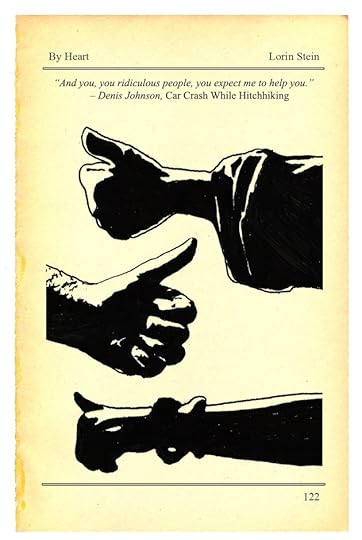 Doug McLean
Doug McLean In the past five years, Lorin Stein has watched something happen at The Paris Review, the literary magazine he edits. A new generation of writers under 40 has emerged, he says; their essays, poems, and short stories don’t sound alike, but they’ve been shaped by the same forces and they share a set of concerns. The goal of The Unprofessionals—an anthology of new work harvested from the Review’s pages, edited by Stein—is to put these voices in one place and let them be taken in together. The result is a dispatch from the front lines of literature.
In our conversation for this series, Stein discussed Denis Johnson’s “Car Crash While Hitchhiking,” a short story that puts The Unprofessionals into context. Stein suggests that “Car Crash” prefigures the best new writing he’s seeing today—understand how it works and why it electrifies, and you’ll see where things are headed. In the story’s troubled first-person voice and ambiguous ending, Stein locates a role for literary writing in our media-saturated 21st century.
Since The Paris Review was founded in 1953, it’s published young unknowns including Philip Roth, Adrienne Rich, and David Foster Wallace. The Unprofessionals is the magazine’s first anthology of new writing in 50 years. Though the book features contributions from a few well-known figures—Ben Lerner, Kevin Young, Zadie Smith—most names will be unfamiliar to most readers. Lorin Stein spoke to me by phone.
Lorin Stein: The stories that excite me most tend to have three qualities. First there’s a voice, a narrator who urgently needs to speak. Even if they never say “I.” Second, the narrator tries to persuade you that he or she is telling the truth. The third thing is, for lack of a better word, wisdom. A kind of moral authority, or at least the effort to settle a troubled conscience.
These three qualities are crystallized in Denis Johnson’s “Car Crash While Hitchhiking,” which first appeared in The Paris Review in 1989. For most of my grownup life I was a book editor. Novels were what interested me. When I thought of short stories, I thought—unfairly—of gray, melancholy, slightly boring, anxiety-producing little intrusions on the day. But then there were stories like “Car Crash.” It has a purity, a lack of machinery, that makes you believe it—the way you’d never believe a novel—from start to finish. I love the idea of finding new writers who could do that. That’s why I took a break from editing novels five years ago and went to work for The Review—a magazine devoted to short fiction
“Car Crash” is recollected by a man who used to be a vagrant and drug addict. One rainy night, he tells us, he was hitchhiking along a road somewhere, and was picked up by a family—parents and two kids. He claims he knew beforehand that this family would be in an accident. He has a premonition. And yet he gets in the car anyway, and doesn’t warn them that something terrible is going to happen.
He doesn’t care. He falls asleep in their car. And sure enough, he’s jolted awake into a horrifying scene: They’ve broadsided another driver, killing him. The narrator is fine, but the husband is only half conscious, slumped over the wheel, choking on his own blood. The ambulance arrives. A cop takes the narrator to the hospital with the rest of the family, where he learns that the husband has died.
Then he sees the widow of the driver. This is the crux of the story. “She had power over us,” the narrator says, “because we knew what was about to happen, and she didn’t.” He watches her walk into the room where she will be told her husband is dead:
The doctor took her into a room with a desk at the end of the hall, and from under the closed door a slab of brilliance radiated as if, by some stupendous process, diamonds were being incinerated in there. What a pair of lungs! She shrieked as I imagined an eagle would shriek. It felt wonderful to be alive to hear it! I’ve gone looking for that feeling everywhere.
This encounter happens out of sight; the narrator only hears the scream and sees the light under the door. But the scream is a kind of revelation: That’s truth. It’s a moment of contact, if that’s the right word.
I forgot to mention something the narrator says earlier, as he remembers the moment after the crash. He describes that husband—the man who’s about to die.
His blood bubbled out of his mouth with every breath. He wouldn’t be taking many more. I knew that, but he didn’t, and therefore I looked down into the great pity of a person’s life on this earth. I don’t mean that we all end up dead, that’s not the great pity. I mean that he couldn’t tell me what he was dreaming, and I couldn’t tell him what was real.
Whatever the widow experiences behind the closed door, that’s what’s real. She comes into the knowledge of what is.
Anyway, that’s the end of the car-crash anecdote. Before the story ends, the narrator mentions having spent time in detox, later on in his life. He mentions having had hallucinations. Then all at once, the last line of the story:
And you, you ridiculous people, you expect me to help you.
Now where does this last line come from? It raises a bunch of questions about the story as a whole. Like, who exactly are these people? Maybe they’re us readers. (But did we expect him to help us?) Who knows—maybe they’re a hallucination. Or people in an AA meeting, possibly. Or: I can’t help hearing a possibility that this narrator thinks he’s Jesus Christ. That this is a story about someone who has (or thinks he has) the power of God—but doesn’t save the people around him.
Whoever he is, whoever he’s talking to, it’s hard for me to read the story without feeling that God is the problem here. To me this is a story about faith, about the idea that there is an omniscient being who may be working in us, and making demands of us, demands we’re really not allowed to shirk. And whether you live up to those demands in the way Jesus is supposed to have done, or don’t, may not be under your control.
So much is happening in that last line, and yet I still have a hard time nailing down one single meaning of it. Much of the payoff here is emotional, not intellectual—I can feel it even if I can’t articulate it. There’s a certain kind of beauty that comes from precision, deep literacy, sense of rhythm, and awareness of the musical possibilities of plain language, that evades logical understanding but hits us in the heart.
Instead of pointing you toward a definitive interpretation, the story opens up a limited ambiguous space. That seems more realistic to me than they lived happily ever after, or then I figured this or that thing out. One thing I don’t like about the average memoir is that it tends to tell a story that adds up to: And that’s how I became the person that I am. I just never believe that kind of story. And because I don’t believe it, I’m not interested in it. I like the kind of memoir, and story, and poem, that says, At least I knew this much. I foreclosed certain possibilities, even if I don’t know the whole simple truth.
That’s something that happens a lot in this anthology we’ve published. You see a narrator on the edge of meaning he or she doesn’t quite grasp. The last line of Amie Barrodale’s story “William Wei,” for instance, is: “I think I can safely say it changed my life.” But I don’t really know how. It’s not that the narrator is delivered into insight. It’s not that the reader knows, either. The questions remain as alive as the answers. But for that to happen, you have to believe in the voice itself. The narrator has to exist as a steady reliable fact.
There’s a certain kind of beauty that evades logical understanding but hits us in the heart.That seems to me especially true of contemporary fiction. I’m not sure why. I’d guess it has something to do with the fact that we don’t read the way our parents or grandparents did, and that writing has become a more and more specialized, marginalized activity. That’s not a bad thing, necessarily. But it means we’ve become interested in the fiction of the speaker. Interested, suspicious, aware. We might ask—in a way that our grandparents wouldn’t have asked—why someone is sitting down at the keyboard at a Starbucks and doing this? It’s no longer given why someone would tell a story on paper, or onscreen. It’s become a troubling question.
So we have all these first-person narrators. When it’s done right, fiction provides the authority to speak about deep things; at the same time, it provides a shield, a mask. The mask lets you say things, talk about things, that you couldn’t ordinarily talk about. You don’t have to make sense in quite the same way. You don’t have to account for yourself in the same way. You don’t have to pretend that you’re a single subject. You don’t have to pretend you’ve got free will. You don’t have to pretend that you’re the master of your conscience. Or that you don’t have forbidden desires that you act on. You can talk about shameful things. I mean, whatever else it is, “Car Crash While Hitchhiking” is a story about shame. And I think literary writing in the first person is very good at dealing with shame. Not getting rid of shame, but exploring it—from behind a mask.
I think there’s a kind of realism—not just in stories, but in poems and essays—that assumes we live in dishonesty, that we lie to others and ourselves as a matter of survival, but that part of us knows the truth when we see it. That’s what interests me: the truths we can’t tell except when we put on the mantle of this authority. That’s the kind of realism I see in this anthology.
This is actually the first anthology of new writing that we’ve done in more than 50 years. There’s something new happening, and it’s been happening for The Paris Review, too—we’ve been lucky. I haven’t yet seen a book that’s captured this moment in our literature, that’s captured our changing relationship to the narrator and point of view. Writers grow up more slowly than they used to. With a very few exceptions, everything in the book was written by someone in his or her 30s. Nowadays that seems to be the age at which many writers come into their own. The moment when they have something to say and the tools to say it.
There’s nothing better, as an editor, than being sent something arresting by a writer whose name you don’t yet know. Usually, the quality just jumps out at you. When you start reading something that’s really an achieved work, it doesn’t matter who the writer is, or whether or not they’ve published. It just calls out to you. You turn off the computer. You sit down. And you read it.









#ActualWorst, Round Three: Jim Moriarty vs. Pete Campbell
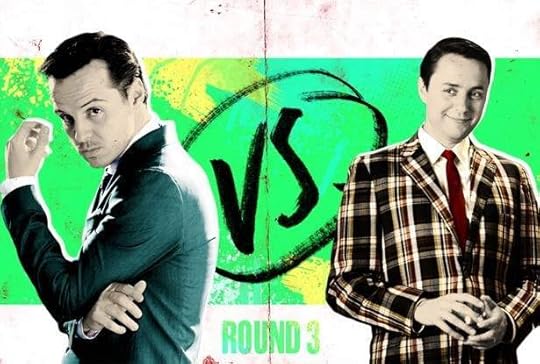
Throughout the month of November, we’re soliciting readers’ help to definitively answer an age-old question: Who is the actual worst character on television? We reviewed your submissions, did our own research, and came up with a list of 32 characters across four different categories, who’ll go head to head over the next four weeks until one of them is crowned as the most despicable, unlikable, flat-out awful (fictional) person on the small screen.
This bracket, while intended to determine the relative awfulness of characters on television, is subject to the fact that “worst” is a complex superlative that can incorporate a number of different qualities. In no way are we suggesting that being a narcissistic 20-something is equivalent to, say, killing people and eating them. Rather, our goal is simply to map out which of these fictional characters we love to hate and which we hate to love.
See the bracket in its entirety here.
The Case for Moriarty (Sherlock)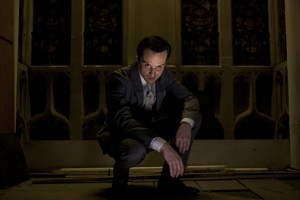 Hartwood Films
Hartwood Films Why this character is the actual worst: Possibly one of the more psychopathic people in this bracket, Moriarty is a consulting criminal to the world’s scariest men and women, and a Joker-style lunatic who’s obsessed with Sherlock. Throughout the first three seasons, he throws complications and odd cases in Sherlock’s path, from Irene Adler to innocent bystanders he attaches suicide vests to and forces to read his texts out loud. On the one hand, he’s one of the few human beings alive who can occasionally outsmart Sherlock; on the other, he murders people out of sheer whimsy.
Worst moment/s: Paying a terminally ill (and very creepy taxi driver) to make riders play a horrible game of Guess Which Pill Is Actually Poison. Framing Sherlock as a self-aggrandizing maniac, and threatening to assassinate John, Lestrade, and Mrs. Hudson unless Sherlock kills himself. Shooting himself in the head (maybe?) to up the ante. Appearing at the very end of the third-season episode “His Last Vow,” giving viewers a heart attack and hinting that he’s not dead after all.
Worst trait/s: Murdering people for kicks, making everyone scared of taxis, never blinking.
Redeeming moments/qualities: He has good taste in music, playing Rossini’s “The Thieving Magpie” when he steals the Crown Jewels, and making Sherlock believe a Bach rhythm is actually a secret code that can open every lock in the world (cmon, Sherlock). He looks like he walked out of a GQ spread (whenever he isn’t pretending to be an out-of-work actor or Molly’s boyfriend). —Sophie Gilbert
The Case for Pete (Mad Men) AMC
AMC Why this character is the actual worst: Pete Campbell isn’t just an asshole. He’s a smug, slimy, entitled, phony, cruel, cheating liar. He is equal parts sadistic and pathetic. The fact that his scuzzy plots—blackmail, adultery, advertising—are so often spoiled can, some have argued, make him seem pitiable. Please. Don’t feel sorry for Pete Campbell. He repeatedly uses his position of power and privilege to keep people down. And he does so in a way that’s as loathsome as it is nauseating.
Worst moment/s: Pete’s worst moments are his most misogynistic. Like the time Peggy asked him to dance—smiling, confident, doing the twist with coworkers in a Manhattan bar—and Pete, seething with contempt, tells her, “I don’t like you like this.” Or the time Pete tried to sell Joan’s body to a Jaguar executive in exchange for an advertising account, telling her: “We’re talking about a night in your life. We’ve all had nights in our lives where we’ve made mistakes for free.” But it’s hard to do worse than the time Pete raped his neighbor, a young German au pair, demanding a reward for having helped her exchange a damaged gown to a department store. The woman’s level of consent is debated among viewers, but her character’s discomfort in the scene is clear.
Worst trait/s: Abuses of power, rampant misogyny.
Redeeming moments/qualities: He can dance a mean Charleston. But don’t think for a second that getting back together with Trudy makes him a better person. Pete’s good fortune is thoroughly, painfully undeserved. And maybe this is what makes Pete Campbell the actual worst: The fact that his character is so realistic, that humans who think like Pete Campbell really do exist, and that they often end up getting what they want—no matter how they act and whom they humiliate along the way. —Adrienne LaFrance









November 16, 2015
Is France at War?
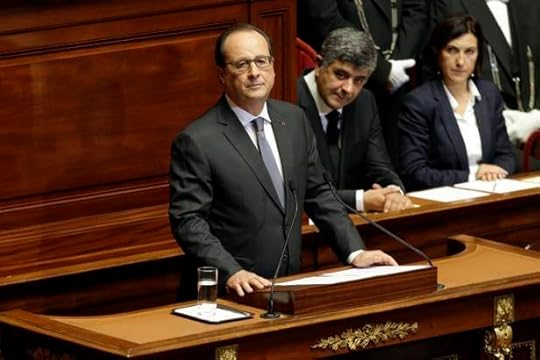
“France is at war,” President Francois Hollande said Monday, addressing a rare joint session of France’s parliament just days after multiple attacks in Paris killed 129 people and wounded more than 300 others. The Islamic State claimed responsibility for the attacks and Hollande has vowed a “merciless” response.
“Terrorism will not destroy the Republic,” he said Monday, “because it is the Republic that will destroy terrorism.”
Indeed, French airstrikes have struck Raqaa, the Syrian city that serves as the Islamic State’s de-facto capital. Warplanes targeted more than a dozen suspected ISIS sites in about 30 airstrikes.
In his speech Monday, Hollande called for an urgent UN Security Council meeting on a joint response to terrorism; a three-month extension of the country’s state of emergency, which was imposed Friday even as the attacks were unfolding; a constitutional amendment so the country won’t have to resort to a state of emergency in response to terrorism; the power to strip the French citizenship of dual nationals convicted of terrorism; more effective border controls for the European Union; and increased funding for the military, police, and security forces.
What he didn’t ask for was authorization of a declaration of war, which parliament must provide under Article 35 of the French Constitution. In theory, Hollande needs only to inform parliament of a decision to intervene abroad within three days of such an intervention.
Hollande hasn’t been shy about using French forces overseas: He sent troops to Mali in 2013 to crush an al-Qaida affiliate. But Hollande is unlikely to go it alone militarily against the Islamic State.
For months now, France has been involved in the fight against ISIS in Iraq and then Syria as part of a U.S.-led coalition—in fact, the Islamic State attributed its attacks to France’s participation in the campaign. And France has other diplomatic and military means at its disposal for a multilateral effort against the Islamic State. One of these is Article 5 of NATO’s charter—which says an attack on one member is an attack on all—the invocation of which would impel the alliance’s other members, including the U.S., to launch a joint military response. France has not taken that approach yet—though at least one American presidential candidate, Marco Rubio, has urged it to. France could also invoke Article 4 of the NATO treaty, which calls for military consultations among the alliance’s members. Hollande hasn’t done that, either.
What he says he will do is meet with U.S. President Barack Obama and Russian President Vladimir Putin in the coming days to form a “unified coalition” against the Islamic State. Russia is also involved in the Syrian Civil War, but is fighting on Syrian President Bashar al-Assad’s side against the Islamic State as well as other rebel groups, some of which are backed by the West.
As one Kremlin advisor put it over the weekend after a meeting between Obama and Putin: The two leaders share “strategic goals regarding the fight against Islamic State … they still differ as far as tactics are concerned.”
Hollande is probably hoping he can bridge some of those differences over tactics.









Congressional Republicans Pick a Fight Over Syrian Refugees

The rapidly-escalating political fight over resettling Syrian refugees has already reached the halls of Congress, where senior Republicans want to use a critical government-funding bill to force President Obama’s hand.
GOP lawmakers are reacting in predictable fashion to reports that at least one of the terrorists involved in the Paris attacks had slipped into the country with refugees fleeing the chaos in Syria. Fearing a similar plot in the U.S., more than a dozen governors (including one Democrat) quickly demanded that the Obama administration keep refugees out of their states. But the real battle may be fought on Capitol Hill over the next several weeks, with an aggressive Republican push that could result in a government shutdown.
The White House and congressional leaders are now negotiating an enormous omnibus spending bill that will appropriate funds for the next 10 months according to the budget agreement that passed in October. That legislation—or another temporary measure—must pass by December 11, when current funding expires. Senator Jeff Sessions, an immigration hard-liner from Alabama, on Monday sent a letter calling for more restrictions on the administration’s plan to admit more than 10,000 Syrian refugees into the U.S. over the next year, including a separate vote by Congress—which would never pass in the current political climate. “It is not sound policy to encourage millions to permanently abandon their homes,” Sessions wrote. “We have resettled 1.5 million migrants from Muslim nations in the United States since 9/11, and it clearly has not contributed to the stabilization of unstable regions.”
Sessions has never been a fan of either legal or illegal immigration, but he argued that the coordinated terrorists attacks in Paris on Friday “add immense new urgency.” A similar call came from the chairman of the House Homeland Security Committee, Representative Michael McCaul of Texas, who in a letter to Obama called for the suspension of the administration’s plan to admit more refugees pending a full review of the program. Representative Devin Nunes, the chairman of the House Intelligence Committee, also voiced opposition to the refugee policy in an appearance Sunday on “Face the Nation.”
Because of the extensive vetting process already in place, fewer than 2,000 refugees from Syria have been resettled in the U.S. And judging from Obama’s remarks Monday in Turkey, a push by Republicans to shut the door to more is likely to meet stiff resistance. The president denounced calls from Republican presidential candidates to admit only Christian refugees from the Middle East and reject Muslims as “shameful” and “un-American.” “We don’t have religious tests to our compassion,” Obama said.
The refugee debate poses an early challenge for the new House speaker, Paul Ryan, who said in an interview Sunday on “60 Minutes” (taped before the Paris attacks) that he thought he could strike an agreement with the White House to keep the government open. On Monday, he was noncommittal on the question of refugees. “We have always been a generous nation taking in refugees, but this is a unique situation,” he said in a radio interview with Bill Bennett. Asked specifically about using the funding bill to restrict refugee resettlements, Ryan said only that he had the House’s committee leaders to review the policy. “We’re looking at all of these options,” he said. “We’ve got to make sure we are protecting ourselves.” Senate Majority Leader Mitch McConnell will also have a big say in the refugee question, but he hasn't indicated where he stand. (A spokesman for McConnell did not return a request for comment on Monday afternoon.)
Ryan and McConnell will surely face pressure on refugees from the right flanks in Congress and from the presidential campaign trail. In perhaps the most outlandish statement of the day, Mike Huckabee tweeted that if Ryan did not "stop the importation” of those fleeing the Middle East, he should step down as speaker—less than two weeks after he formally took the job.
In the immediate aftermath of the Paris attacks, the politics seem to be shifting faster than the facts can be established. Was one of the attackers someone who posed as a refugee? That’s still unclear. A report on Monday afternoon from The Independent suggests that the passport belonging to the bomber in question may have been forged. And even if Republicans press forward with their refugee demand, it joins dozens of policy concessions they’ll seek to win in the upcoming spending fight, including restrictions on Planned Parenthood, environmental regulations, Obamacare funding, and more. What’s clear is that while keeping the government open never seems to be an easy job for Congress these days, the political fallout from the attacks in Paris might make it even harder now.









How the Paris Attacks Are Changing the EU ’s Debate on Refugees
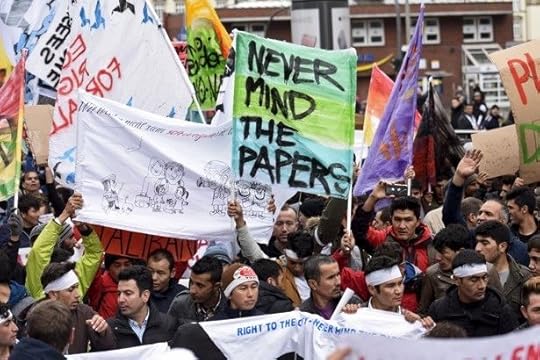
The revelation that one of the suicide bombers who carried out Friday’s attacks on Paris entered Europe last month through the Greek island of Leros has complicated the increasingly fragile European plan to handle an historic migrant and refugee crisis.
More than 700,000 people have entered Europe this year from the Middle East, Africa, and elsewhere. Ahmed al-Mohammad, the suicide bomber, was one of them. He entered Leros in early October, and then crossed into Serbia a few days later. This scenario has increased concerns that terrorists affiliated with the Islamic State can, with ease, infiltrate European borders by posing as refugees.
Konrad Szymansk, Poland’s European affairs minister, said Saturday the country will not take its share of refugees and migrants without “security guarantees,” but did not say what such guarantees would entail.
“The [Paris] attacks mean the necessity of an even deeper revision of the European policy toward the migrant crisis,” he said.
Robert Fico, the prime minister of Slovakia, echoed Szymanski’s remarks.
“We have been saying that there are enormous security risks linked to migration,” he said Saturday. “Hopefully, some people will open their eyes now.”
Under a new European Union program established in September, Poland and Slovakia reluctantly agreed to accept a certain number of asylum-seekers. Slovakia, the Czech Republic, Hungary, and Romania voted against the quota system, but were overruled by their fellow member states.
The head of the European Commission on Sunday warned against such thinking.
“We should not mix the different categories of people coming to Europe,” Jean-Claude Juncker told reporters. “I would invite those in Europe who try to change the migration agenda we have adopted—I would like to remind them to be serious about this and not to give in to these basic reactions that I do not like.”
France, Belgium, and Italy have all increased security at their borders since the attacks, which killed at least 129 people and injured hundreds Friday night.
There has been little consensus within the EU on how to handle the migrant and refugee crisis, and reaction to the Paris attacks will likely further splinter the bloc’s response. Under current EU law, people are allowed to move freely without passports within the internal borders of the Schengen area, which comprises 26 European nations. Days before the attacks in Paris, the president of the European Council warned that, without “effective” border control, this system “will not survive.”
French President François Hollande appeared to echo those views on Monday.
“If Europe doesn’t control its external borders it is the return of national borders of walls and barbed wire as we’ve seen today,” he told a joint session of parliament. “This would mean the dismantling of the European Union.”
Member states have largely acted alone in attempting to manage the flood of people entering their borders. Germany, which once welcomed Syrian refugees, said last week it would send some back to the first EU country they entered. Hungary—the major transit country for people trying to reach Germany, Sweden, and other, richer nations— constructed razor-wire fences along its borders with Croatia and Serbia last month. Slovenia began building its own barrier with Croatia last week. Finland has run out of room in its refugee centers, and Sweden has imposed temporary border controls so authorities could keep up with new arrivals.
In the United States, several Republican governors said after the Paris attacks that they won’t accept any of the 10,000 Syrian refugees the federal government has pledged to take in next year, citing national security concerns. Arab-American leaders and refugee advocates criticized the announcements as alarmist. As my colleague David Graham wrote Monday, “there’s no magic formula for striking the right balance of security and humanitarianism, but the process for [resettling] Syrian refugees is hardly cursory—in fact, until the Paris attacks, there was a great deal of criticism arguing it was far too strict.”
Some U.S. Republican presidential candidates said Syrian refugees must be heavily screened before they are resettled on American soil. Former Florida Governor Jeb Bush said Sunday “we should focus our efforts as it relates to refugees on the Christians that are being slaughtered.”
President Obama criticized that suggestion on Monday.
“That’s shameful,” he said at the G20 summit in Turkey. “That's not American, that’s not who we are. We don’t have religious tests to our compassion.”
More than 3 million Syrians have fled their home country since the start of the civil war in 2011.









#PrayForParis: When Empathy Becomes a Meme

The world’s most iconic monuments, awash in blue and white and red. Human faces, replaced with the stark black and white of Jullien’s Eiffel Tower. French flags, filtered over photos. Hashtags. Emoji. #Parisjetaime. #Jesuisparis.
People, this weekend, grasped for ways—ways that were at once not nearly enough and the most that could be done—to express their sadness and their solidarity and their fear and their empathy after Paris was attacked on Friday. Ways for people to convert compassion into media. Ways for them to insist, despite all evidence to the contrary, that “je suis Paris.”
Related Story
An Optimist’s Guide to Political Correctness
It’s easy to be just a little bit indignant about all of that—to dismiss it all as self-indulgent slacktivism in the vague manner of #kony2012 and #bringbackourgirls and rainbow-filtered profile pictures. As Rurik Bradbury, author of the Twitter feed @ProfJeffJarvis, told The Washington Post’s David Weigel in an email, “The social media reaction to a tragedy is a spaghetti mess of many strands, some okay but most of them useless. There are positive elements (in intention, at least), such as the #porteouverte hashtag and the Facebook ‘Safety Check’ in Paris—though it remains to be seen how many people actually gained from these, either finding a place to stay or letting relatives know they were okay.”
He continued:
But the part that feels the most useless to me is people’s vicarious participation in the event, which on the ground is a horrible tragedy, but in cyberspace is flattened to a meme like any other. Millions of people with no connection to Paris or the victims mindlessly throw in their two cents: performative signaling purely for their own selfish benefit, spreading information that is often false and which they have not vetted at all, simply for the sake of making noise...
Instead of silence or helpfulness, social media pukes out stupidity, virtue-signaling and vicarious “enjoyment” (in a psychoanalytic sense) of a terrible tragedy by people thousands of miles away, for whom the event is just a meme they will participate in for a couple of days, then let fade into their timeline.
Bradbury makes a very good point. There is something self-centered about this conversion of empathy into smarmery, something distasteful and perhaps worse about this mass impulse to put the “me” in “meme.” It is a kind of slacktivism. It is a kind of performance. It is a kind of posturing.
What it also is, though, is an act of mass compassion. Even more specifically: It is compassion that has been converted, via the Internet’s alchemy, into political messaging. It is empathy, quantified. Facebook, today, is awash in blue and white and red. The social network has become its own kind of flag.
That will change, of course, as people forget and move on and go about their lives, just as all the “je suis Charlie” avatars reverted soon enough to human faces, just as all the marriage-equality rainbow filters dissipated, inevitably. The attention will also, as it were, flag. But, for now, all these expressions of solidarity with France are notable. Together, they treat the Internet not just as a commercial platform or a public square, but as an engine for empathy.
They represent a new kind of ability that we humans have—one that Facebook is just figuring out how to work with, and one that the rest of us are figuring out along with it.
The filters and hashtags treat the Internet not just as a commercial platform, but as an empathy engine.It’s notable, in this instance, that all the French flag filters on Facebook, like the rainbow filters supporting marriage equality, have come from Facebook itself. (Similar efforts have sometimes come from users or political organizations, as with Planned Parenthood’s “Pink Out” day.) The company has directly encouraged its users to activate the filter on their profiles, keeping updates about the filter option high up on users’ newsfeeds and accompanying those updates with a message that reads, “Change your profile picture to support France and the people of Paris.”
It’s hard not to see this in the context of Facebook’s development of an “empathy button”—a mechanism, essentially, for users to express solidarity with a news event or an argument without literally “liking” it. As Mark Zuckerberg explained earlier this year, “What [people] really want is to be able to express empathy.”
Not every moment is a good moment, right? And if you are sharing something that is sad, whether it’s something in current events like the refugee crisis that touches you or if a family member passed away, then it might not feel comfortable to Like that post. But your friends and people want to be able to express that they understand and that they relate to you.
The memes are all, in their way, an empathy button. They work to convert shock and sadness and solidarity into currency. And, in the process, into data. You can argue both for and against that state of affairs, but it is all part of the new access people have to each others’ lives via the Internet, and by extension of The Way We Grieve Now. The expressions of empathy that come from it are sometimes awkward and sometimes self-indulgent and sometimes #toosoon and sometimes #toolate. What they ultimately acknowledge, though, is a deeply human thing, and a thing that has the potential to make its mark on politics and culture and our sense of what communities can be: the notion that “that could be us.” That, in ways big and small and superficial and profound, “je suis Paris.”









‘It’s Best That We Don’t Shoot First and Aim Later.’
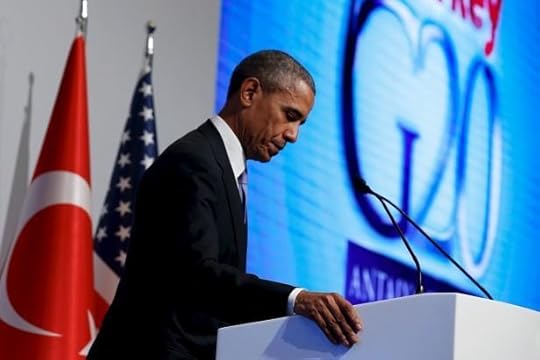
President Obama chafed as reporters questioned him repeatedly about America’s strategy to counter the Islamic State, in his first expansive remarks after the Paris attacks.
Speaking after the G20 summit in Turkey, Obama was asked whether he had underestimated the Islamic State, if the post-attack calls for more troops would alter his thinking on Syria, and if the violence in Paris had proven that success against Islamic State forces had been elusive.
In the president’s view, the answer to all these queries is ‘no.’ Instead, he reiterated that what happened in Paris would not lead to a shift in American policy or a scaling up of forces in Syria.
It is not just my view but the view of my closest military and civilian advisers that that would be a mistake because we would see a repetition of what we’ve seen before, which is if you do not have local populations that are committed to inclusive governance and who are pushing back against ideological extremes, that they resurface, unless we’re prepared to have a permanent occupation of these countries.
He also chastised his critics for offering no alternatives and “talking as if they’re tough” in suggesting that the United States offer up more troops to fight.
Nevertheless, Obama is encountering pushback from within his own party as well. On Monday, Senator Dianne Feinstein, the leading Democrat on the Senate Intelligence Committee, told MSNBC’s Andrea Mitchell that, “ISIL is not contained. ISIL is expanding. They’ve just put out a video saying it is their intent to attack this country.”
Feinstein added she believes that more than the 50 special operations soldiers currently in Syria are needed to “really make a difference on the ground.”
Despite this sentiment, which was echoed much more muscularly by a range of 2016 presidential candidates, the president was most effective when making clear the cost of escalation. “This is not an abstraction,” he said. “When we send troops in, those troops get injured. They get killed.” He added:
Every few months I go to Walter Reed and I see a 25-year-old kid who is paralyzed or who has lost his limbs. And, some of those people I have ordered into battle. So, I can’t afford to play some of the political games others make.
The events in Paris have inspired renewed criticisms not only of Obama’s strategy in battling ISIS, but also his aversion to labeling terrorism an upshot of Islamic extremism. Obama addressed the latter by invoking his predecessor, George W. Bush, whom he praised for famously saying in the days after September 11, 2001, that terrorism was a distortion of Islam.
Obama also directly addressed remarks and pledges made by some Republican governors and presidential candidates to block the settlement of either Syrian or non-Christian refugees in the United States, calling them “shameful.”
“That’s not American. That’s not who we are,” he said. “We don’t have religious tests to our compassion.”









To Attack a Concert
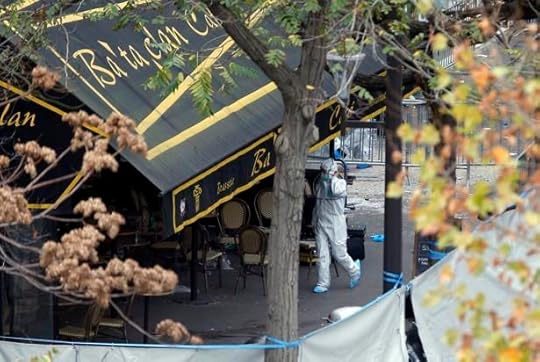
A little less than a month before gunmen killed 89 people at his band’s concert in Paris, Josh Homme told Rolling Stone why Eagles of Death Metal were releasing their first album in seven years: “We realize that our lack of putting out a record, that absence of Eagles of Death Metal music, had a really negative byproduct. There were all sorts of Middle East troubles and all these other things, so we’re sorry for that.”
“So essentially [the album] Zipper Down is the Eagles of Death Metal response to terrorism?” asked the reporter.
“Yeah,” Homme replied. “We put out a record and human rights are better, the world feels better, people make more money, there’s less anger, people are more respectful to women and to homosexuals, and they’re generally nicer each other, they’re kinder to each other, and that’s why we really felt like it was time to let the healing begin.”
Homme was joking, of course, and it’s probably best not to indulge speculation from some on social media that his statement had anything to do with ISIS hitting the Bataclan concert hall on Friday. But the quote is still worth thinking about, because of how it slyly sums up the aspiration behind most music: Play good songs, and you make the world a better place.
Among the many, many awful aspects of what happened in Paris is the fact that the attacks so viciously clashed with that idealism. No one can know exactly why terrorists chose the sites they did, but all were places that people gathered for enjoyment, and the worst bloodshed happened at one of more joyful kinds of gatherings that can exist—a concert. Some of the most wrenching photos of the ordeal are ones of excited Eagles of Death Metal fans before the killing began.
Any mass gathering carries an element of risk with it, and music shows have become tragedies before—the Great White fire, the Pearl Jam stampede, the Altamont violence. But this is a different sort of horror; neither an accident nor a spontaneous flaring of conflict among patrons, but a premeditated assault from outsiders. The closest comparisons might be with the historical instances of terrorism at sports matches and religious events, both places where people are vulnerable precisely because they’ve come to connect with other people.
The ideals that concerts represent: communion, peace, affirmation of how awesome life can be.Eagles of Death Metal play scuzzy, clever, loud blues rock that both celebrates and satirizes the idea of rock as an expression of macho, swaggering power. They have existed since 1998, and are known largely for their association with Homme, whose other band is Queens of the Stone Age. All of the band’s members survived Friday night (Homme wasn’t there), though their merchandise manager Nick Alexander—a veteran who’d worked with lots of rock acts that have toured Europe—did not. The main thing about the band, as fans who attended the Bataclan surely knew but the terrorists perhaps did not, is that they stand for good times. In the same Rolling Stone interview where world peace came up, their leader Jesse Hughes talked about the point of the band’s concerts. “We kind of have a rule with Eagles of Death Metal that it’s the fun show,” he said, “and we want everyone to belong.” There’s now a campaign to get their cover of Duran Duran’s “Save a Prayer” to the top of the U.K. charts.
For a while and maybe forever, attending concerts will feel a bit scarier, a bit more defiant, and maybe simultaneously sadder and more joyful. Security has been stepped up at some venues; U2 and the Foo Fighters canceled European dates after what happened; on stage in Sweden, Madonna said she considered canceling as well but decided that would mean the attackers had won. Across the music world, a common response has been to reassert the ideals that concerts represent: communion, peace, affirmation of how awesome life can be. On Friday night on Twitter, the music critic Ann K. Powers started the hashtag #livemusicheals, inviting people to share their favorite concert memories. “Listening and dancing and singing together is one of humanity’s great pleasures and profound experiences,” she wrote. “Music grows love among strangers.”









Could The Force Awakens Be an Oscar Contender?

The 2015 Oscar race is measuring up to be a strange one for two reasons. The first is that it’s the middle of November and there’s no obvious frontrunner in theaters now, nor is there a juggernaut coming in December that seems destined to scoop up acclaim and trophies. The second is the fact that Star Wars: The Force Awakens comes out December 18, and no one can shut up about it. J.J. Abrams’s rekindling of George Lucas’s sci-fi franchise is predicted to be among the most successful films ever released, but the hype has reached such a fever pitch that it poses a legitimate question: Could The Force Awakens, the seventh film in a sprawling saga, actually be an Oscar contender?
Related Story
How Original Can The Force Awakens Be?
Vanity Fair’s executive west-coast editor, Krista Smith, raised the prospect of The Force Awakens getting play in the major Oscar categories on the podcast Little Gold Men, and not simply as a thought experiment. Though it’s harder for genre filmmaking to get much traction with the Academy, the easiest way to do it is to make a lot of money (like, a lot of money) as well as get good reviews. That’s how the original Star Wars was nominated for Best Picture in 1977; same for E.T. in 1982, Avatar in 2009, and Gravity in 2012. The Force Awakens is going to make a lot of money—that much is sure. If it’s also well-reviewed, could that launch it near the top of an uncertain Oscar list?
As Smith noted, this is the reason the Oscars expanded the Best Picture shortlist in 2009, first allowing 10 films to be nominated rather than five, then altering it to between five and 10 based on voter enthusiasm (in recent years, eight to nine films have been nominated). After the much-noted snub of The Dark Knight in 2008, the Academy acknowledged its issues recognizing more mass-market hits with the rule change. The Force Awakens promises to be a box-office monster, but it’s been decades since the Star Wars franchise was critically acclaimed, meaning it wouldn’t be too hard for the film’s reviews to outdo expectations. Couple that with absurd ticket sales and the nostalgic instincts of a generation now old enough to be Oscar voters, and you’ve got a campaign.
This theory is helped by the perceived limpness of the year’s movies so far. Practically every big-ticket “prestige” film has some major knock against it. Steven Spielberg’s Bridge of Spies has been a low-key hit, but it hasn’t generated the wild enthusiasm voters might associate with the director’s previous Oscar winners. Steve Jobs was well-received, but a box-office disaster. Room is critically beloved but is nonetheless a small, tough-to-watch indie that will likely get more traction in acting categories. Some predicted big hitters like Suffragette and Black Mass fell off the map thanks to middling reviews; others, like David O. Russell’s Joy and Alejandro González Iñárritu’s The Revenant, remain on the horizon, but will need to be sensations to build buzz thanks to their late release dates.
It says something about 2015 that Spotlight, Thomas McCarthy’s small, powerful drama about journalism done right, is a perceived frontrunner to win the big prize, despite its lack of any epic visual flair. Spotlight would be a worthy winner, but it will have to fight to sustain its buzz in the crowded Thanksgiving to Christmas season, when a slew of “worthy” films are suddenly dumped onto audiences’ laps. Small-scale dramas like Brooklyn, The Danish Girl, and Carol will expand around art-house theaters nationwide, and bigger-budgeted contenders like the Wall Street satire The Big Short and Quentin Tarantino’s The Hateful Eight are also en route. It’s a tough time for a small film to keep being noticed.
Especially when there’s a new Star Wars movie happening at the same time. That’s the real reason the Oscar question is being asked of The Force Awakens: Despite all the hoopla, no one can yet quantify just how much of a phenomenon the film is going to be. Among other things, the Oscars are designed to celebrate Hollywood, and in a year that’s had its surprises and disappointments on that front, The Force Awakens should be the big ticket that eases the industry’s financial disappointments as it battles home media and declining sales. Big business isn’t the only factor in determining Oscar success, but as voters look for a consensus pick to cluster around, it can’t be underestimated.









Rejecting Syrian Refugees
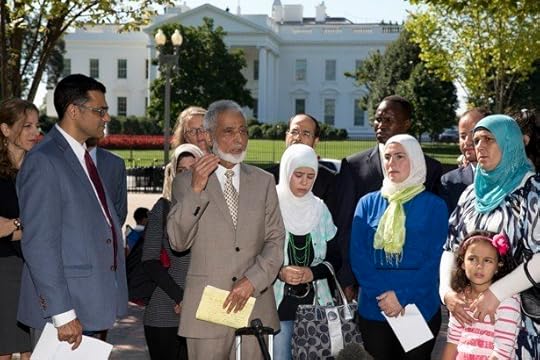
Updated on November 16, 2015, at 12:10 p.m.
Between April and October of 1980, amid an economic downturn, Fidel Castro announced that Cubans who wanted to leave could do so. It precipitated a mass exodus toward the United States. Around 125,000 Cubans fled the island in the Mariel boatlift. The question was what to do with them once they arrived. After all, huge infusions of refugees are often unwelcome, and rumors that the “Marielitos” included many released criminals made many Americans even less welcoming.
In May, President Jimmy Carter informed Arkansas Governor Bill Clinton, then nearing the end of his first term in office, that 20,000 of the immigrants would be housed temporarily at Fort Chaffee in northwest Arkansas. Clinton backed the move by his fellow Democrat publicly, but was privately furious: “How could you do this to me? I busted my ass for Carter. You’re gonna get me beat.” Once they’d arrived, the resettlement process ground to a halt, and in June, a riot erupted, and Clinton called out the National Guard. Several months later, as he’d predicted Clinton lost his bid for reelection to Frank White, a first-time candidate for office. In the same election, Carter lost the White House. The story turned out happily for Clinton, who defeated White in 1982 and went on to become president, but Carter and Clinton reportedly still dislike each other.
The Fort Chaffee story is largely forgotten by the general public, but it’s a good bet that some governors haven’t forgotten its political lessons. On Sunday, after reports that participants in the Paris attacks may have entered Europe alongside the waves of refugees leaving Syria, the Republican governors of Alabama and Michigan announced their states would refuse Syrian refugees. Monday morning, two more Republican governors, Asa Hutchinson of Arkansas and Greg Abbott of Texas, followed suit. Abbott wrote President Obama a letter urging Obama “to halt your plans to allow Syrians to be resettled anywhere in the United States.” (Speaking from the G-20 summit in Turkey on Monday, President Obama vowed not to “shut the door” to Syrians.)
Related Story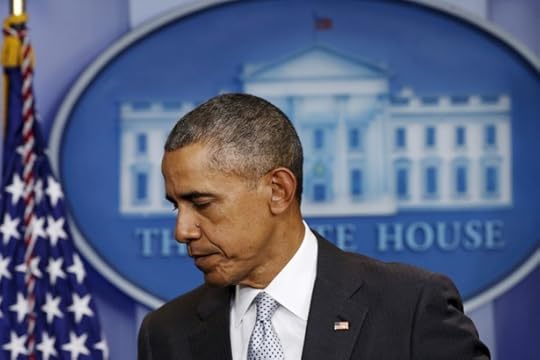
How the 2016 Candidates Responded to the Paris Attacks
“I will not place Alabamians at even the slightest, possible risk of an attack on our people,” Governor Robert Bentley said. “Please continue to join me in praying for those who have suffered loss and for those who will never allow freedom to fade at the hands of terrorists.”
Alabama does not immediately appear a likely terrorist target, and officials said there were no specific threats. There is a State Department-approved refugee-processing center in Mobile, but apparently no Syrians have been processed or resettled in Alabama.
More interesting is Michigan, where Governor Rick Snyder was the first to announce he’d block resettlement. “Michigan is a welcoming state and we are proud of our rich history of immigration,” he said in the statement. “But our first priority is protecting the safety of our residents.” The Great Lake State has the highest proportion of Arab American residents, and the second highest number of Arab Americans, in the nation. In September, when he announced his intention to accept refugees, Snyder had presented it as a matter of neighborliness. “Isn't that part of being a good Michigander?” he asked.
Meanwhile, Republican Senator David Vitter, who polls show trailing in his bid to be elected governor of Louisiana on Saturday, tweeted, “Syrians have already started arriving in Louisiana. That needs to stop immediately. I'll continue to lead that fight & protect Louisianians.”
As Monday went on, more GOP governors were joining the push. Louisiana Governor Bobby Jindal, a presidential candidate, Indiana Governor Mike Pence, and even Charlie Baker, governor of liberal Massachusetts, all followed suit.
Arab American leaders and refugee advocates criticized the moves as alarmist. There’s no magic formula for striking the right balance of security and humanitarianism, but the process for Syrian refugees is hardly cursory—in fact, until the Paris attacks, there was a great deal of criticism arguing it was far too strict. Vetting can take up to two years.
“The ostensible reason for the delay is concern for national security, but in fact the obstacles are mostly bureaucratic,” wrote George Packer. “Throughout the region, refugee-processing centers are understaffed and underfunded. For more than a year, interviews with refugees in Lebanon—where a million displaced Syrians live—have been suspended while the U.S. Embassy undergoes renovations.”
The result is that the U.S. goal for resettlement by the end of the year—before the four bans, which may not be the last word—was just 10,000 refugees. That’s a minuscule fraction of the estimated 4.3 million people who have fled Syria. Refusal to accept refugees amounts to a vote of no confidence in the State Department’s vetting process, and that appears to be well within the governors’ rights. The State Department in September suggested that states would have a say in whether refugees were resettled there.
So far, Democrats have mostly lined up behind the president, just as Bill Clinton did in 1980. During Saturday’s Democratic debate, the three candidates all argued for increased refugee resettlement. Among Republican candidates, there’s little room to move to the right, as many of them have been calling for a stop on Syrian refugees since well before the Paris attacks. On Monday, Ben Carson called on Congress to defund the resettlement program altogether.
On Sunday, Jeb Bush, himself a former governor, called for a straightforward religious test for refugees. He said American efforts should focus on Syrian Christians.
“In addition to that, Jake, I would say that there are a lot of Christians in Syria that have no place now,” he said on CNN’s State of the Union. “They will be either executed or imprisoned either by Assad or by ISIS. And I think we should have—we should focus our efforts as it relates to refugees for the Christians that are being slaughtered.”
Bush’s claim is somewhat suspect. The Assad regime seems to be comparatively friendly to Syrian Christians. (During the last Republican debate, he claimed that Christians were being beheaded in Lebanon, to the bemusement of Lebanese Christians.)
Obama angrily lashed out at Bush Monday, without naming him.
“When I hear folks say that maybe we should just admit the Christians and not the Muslims, when I hear political leaders, saying there would be a religious test for which a person feeling from a war-torn country is admitted, when some of those folk themselves come from families of people who fled political persecution—that’s shameful. That’s not American. We don’t have religious tests to our compassion,” Obama said, pointedly praising Jeb Bush’s brother George W. Bush for inclusiveness toward Muslims.
Meanwhile, Jake Tapper’s follow-up question to Jeb Bush on Sunday elicited a telling response.
“How does the United States, how do screeners tell which refugees are Christian and which ones are not?” the host asked. Bush replied: “Well, we do that all the time. We do that. It takes almost a year for a refugee to be processed into the United States.” Perhaps the screening process is strong enough after all.









Atlantic Monthly Contributors's Blog
- Atlantic Monthly Contributors's profile
- 1 follower



